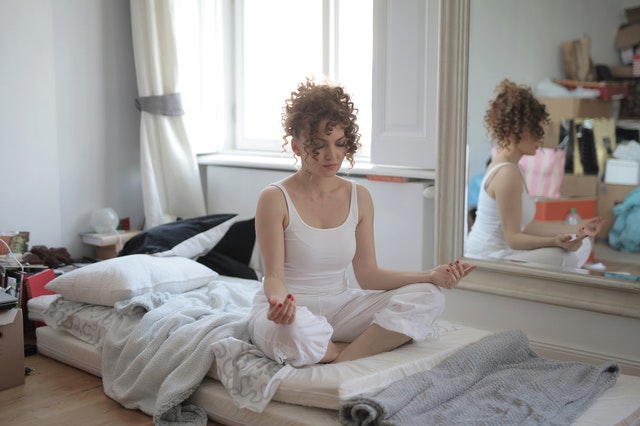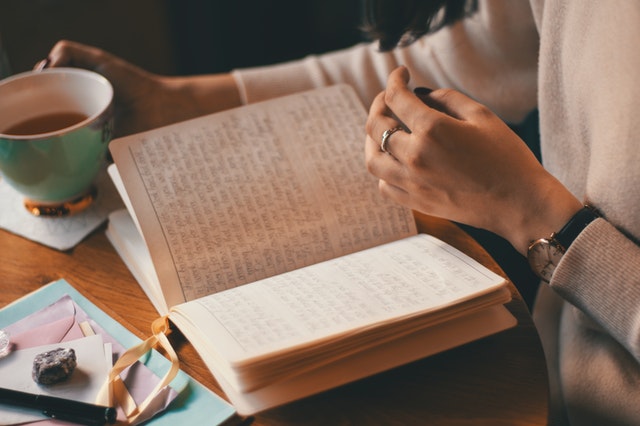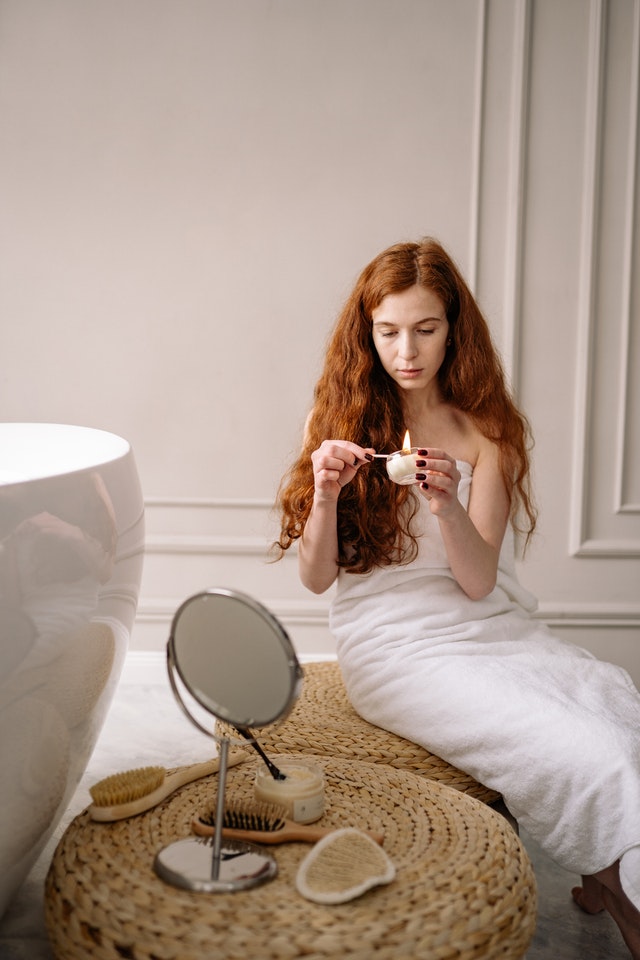For the first half of 2020, I was terrified of the unknown looming future but also felt hopeful for things to change. There was a cataclysm of change that hung in the air at the beginning of the global pandemic, but as the months dragged on, – as protests felt silenced, political campaign promises were broken, and the misinformation spread – hope seemed to dim. The current timeline that we’re living in seems to call for focus and energy that is just beyond our grasp. With all of this growth and upheaval, chaos, and uncertainty, we’re burnt out and in need of some stable footing.

Living through a pandemic carries the type of exhaustion that exists in the moments after waking in the middle of the night from a fever-dream where you’re running down a tunnel that stretches on forever and you can’t see any light ahead of you. There’s something intense about living through a pandemic in your mid-20s, early-30s which are your prime quarter-life crisis age, or if you’re into Astrology, your Saturn Return.
I spent the last year feeling out of control in my own life. COVID brought old issues back to the surface and it forced me to confront patterns and heal old wounds. This understanding came only after I felt every relationship in my life collapse in some way around me. Including relationships that existed entirely online.
I lived alone in a new apartment during a global pandemic and things felt unfamiliar and foreign. It took a while for my place to feel like the safe haven I hoped it would. I worked full-time and remotely and I would often forget to eat or use the bathroom. I was glued to my computer for what felt like way more than 40 hours a week. I was so drained by the end of each day that I grew jealous of the friends and family members who had lost their jobs due to COVID. Then I felt guilty and ashamed for having those feelings. In some ways, I regressed, and by the end of summer 2021, I had become heavily guarded and quick to assume the worst of everyone and everything in an attempt to protect myself from any unpredictability. I retreated into my head and made up stories to cope with the isolation. Just like I had done all those times before as a lonely kid.
“I spent the last year feeling out of control in my own life. COVID brought old issues back to the surface for me, asked me to confront patterns and heal old wounds.”
In the midst of my struggle as I tried to figure out where I fit into a world of uncertainty, I found an opportunity. Or better still, it found me. A new friend had posted on Instagram that she was looking to guide a cohort of women through an exploratory that she coined “40 Days of Devotion” practice. This practice centered on a 40-day commitment of journaling, meditation, and exercising gratitude. The goal was to help us collectively stay present, get us out of our heads, and form bonds with strangers who would encourage us along the way.
I learned a lot from my own 40-day practice, like how to soften to the world and open up space for others. How to pause and take stock of the important things in front of me. How to forgive and breathe through the tough days without self-shaming. I also learned how to cope with COVID uncertainties.
My Mornings
I started each morning with my phone on airplane mode and an alarm set for 6:30 a.m. (some mornings, I snoozed it for up to an hour). I’d make a cup of tea and as that was brewing, I would light a candle at my intentional space. I was advised to fill this space with items that make me feel good. I adorned mine with meaningful objects. An antique blue bottle filled with dried flowers from the first and only partner to ever gift them to me, an abalone shell with a sage bundle that was purchased to cleanse the apartment after the partner moved out, photographs of old and new friends, a periwinkle candle hand-dipped by a kind man in his Sugarloaf shop.
Setting the Mood for the day
As the tea cooled, I set my attention to the journal and began with the prompts: ‘I woke up feeling’, “I need’, and “my intention is”. Then, I asked Alexa to set a timer for 40 minutes. When my anxiety was high some mornings, I meditated along to Sam Harris YouTube videos, or practiced some breath work (particularly box and alternate nostril breathing).
If I woke up that morning feeling a bit lost, I gave myself Tarot or Rune Stone readings to help get me back on track. Then I would pick up my copy of “Be Here Now” and read it until I felt more present.
If I woke up feeling restless, I stretched or I danced or I shook my body out like a dishrag. Sometimes I spent minutes studying myself in the mirror until I cried through whatever thoughts popped into my head.
The mornings I woke up inspired, I sang or I practiced the guitar, or I continued journaling until the timer went off.
At the end of each practice, I went back to my journal to reflect, answering more prompts with the affirmations: “I am grateful for”. Then I’d blow out my candle, bow my head, and thank myself for showing up.
“The 40 Days of Devotion made me more aware of the power I wield to transform my inner-narrative.”
I posted my thoughts and photos from each day on my Instagram stories, and friends would always respond with questions. By the end of the 40 days, they wanted to know how I was doing. I told them I felt successful. I wasn’t completely healed, but I understood the process of healing. The daily practice looked different each morning, but I was consistent and I completed it. On tougher days, if I woke up later than I wanted or spent less than half of the intended time, I didn’t beat myself up for it. I held myself and loved myself through it all, and I was supported and safe with the other participants and the distant friends that checked in with me online.
Even now, long after the experiment has ended, I still make a conscious effort to start my mornings with gentleness. I devote a portion of the day to myself in some spiritual or creative way that centers me like writing, stretching, or meditating. I try to end my nights by going over what I’m grateful for from the day in my head. I practice gratitude for other things, like taking myself out for a nice dinner or allowing myself to rest. I practice managing expectations and forgiving myself for falling short.
 I feel like, the days of making COVID-related jokes, painting signs to encourage togetherness within our communities, and celebrating our health care workers are long gone. Yet the pandemic rages on. COVID uncertainties have created a new way of life for so many of us and have left us with little answers to help make sense of it all. There are plenty of days that feel like I am just wandering around in the dark, afraid to move forward but desperate to figure out how to. The 40 Days of Devotion exercise wasn’t a magical solution to anything the pandemic has given us, but it did make me more aware of the power I wield to transform my inner narrative. Whenever I am able to give myself time to slow down, I can try to quell the overwhelming sense of dread by replacing stories of “what might go wrong” with a bit of hope for “what can go right.”
I feel like, the days of making COVID-related jokes, painting signs to encourage togetherness within our communities, and celebrating our health care workers are long gone. Yet the pandemic rages on. COVID uncertainties have created a new way of life for so many of us and have left us with little answers to help make sense of it all. There are plenty of days that feel like I am just wandering around in the dark, afraid to move forward but desperate to figure out how to. The 40 Days of Devotion exercise wasn’t a magical solution to anything the pandemic has given us, but it did make me more aware of the power I wield to transform my inner narrative. Whenever I am able to give myself time to slow down, I can try to quell the overwhelming sense of dread by replacing stories of “what might go wrong” with a bit of hope for “what can go right.”
How You Can Deal with COVID Uncertainties
To help ground your anxiety in uncertain times, you can start your own committed practice with these ideas in the morning:
- Breath Work (alternate nostril, box, or belly breathing)
- Journaling (start with “I am grateful for” prompts to help get you started)
- Meditation (check out Spotify or Youtube for free, guided meditations)
- Stretching or Yoga (or dancing, just move your body!)
- Music (pick up an instrument or warm up your vocal cords)

